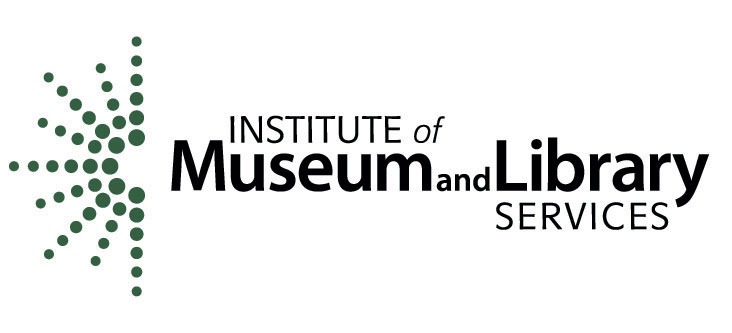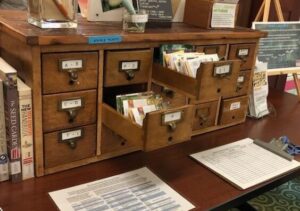SEED LIBRARY
The Lora Robins Library offers a Seed Library: a circulating collection of seeds that people can borrow, plant, harvest, save, and—if all goes according to plan—return to the library for others to borrow.
Through seed saving, we celebrate biodiversity, nurture locally adapted plant varieties, and foster community resilience, self-reliance and a culture of sharing. The Seed Library is a free program included with admission to Lewis Ginter Botanical Garden; all who fill out the registration form in the library are welcome to participate, regardless of membership status at the Garden. Children are encouraged to participate with the help of a parent or caregiver.

FREQUENTLY ASKED QUESTIONS
What is a seed library?
A seed library is a circulating collection of seeds that people can borrow, plant, harvest, save, and—if all goes according to plan—return to the library for others to borrow.
Who can use the Seed Library?
Access to the Seed Library is included with Garden admission; all who fill out the registration form are welcome to participate in the seed library, regardless of membership status at Lewis Ginter Botanical Garden.
How does the Seed Library work?
Seed Library participants will:
• Choose seeds to borrow and grow.
• Record seed details on an empty seed packet.
• Add a few seeds (using the spoons provided) to your labeled packet.
• Fill out the sign out sheet with list of seeds borrowed.
• Go home and plant! Enjoy the harvest and please save some seeds to return to the Seed Library for future borrowers.
Is this seed library legal?
Yes. The Virginia Department of Agriculture and Consumer Services (VDACS) policy is to exempt Seed Libraries from requirements of the Virginia Seed Law provided there are no monetary or seed exchange requirements for seed(s) obtained from the Seed Library.
How do I know that I’m borrowing healthy, accurately labeled seeds?
Like all library services, a seed library is an exercise in trust that encourages participants to learn and grow. All participants should read and adhere to the Seed Protocol to ensure that borrowers get healthy, accurately labeled seeds. Participants are also encouraged to learn about safe seed saving practices using materials available here in the library; our “Saving Seeds” Library Guide is a good launching point.
What is the Seed Protocol?
The following guidelines help us ensure that seed borrowers get accurately labeled seeds, and that participants share only healthy plants to minimize the chance of spreading plant diseases.
1. Save from healthy plants. Even if a disease is not passed on through seed, we like to have some selection for disease resistance by only saving from healthy, strong plants.
2. Save from a number of plants so that the seed has some genetic diversity. The optimum quantity depends on the type of plant; for self-pollinating plants, a minimum of 6 plants is necessary, while for cross-pollinating plants, you will want to save from a larger population.
3. If the plant cross-pollinates, keep it isolated to ensure that it stays “true to type.”
4. Check with a seed saving chart or book to get isolation distances.
5. When you bring seed to share at the Seed Library, please label your seeds with as much information as possible.
6. On occasion, we may save seed from a favorite plant that might not come from a large population of plants or isn’t very healthy, or come from interesting crosses that developed naturally. You may share those seeds, but please share those details on the label to ensure that other borrowers know that they are participating in your experiment.
*The Seed Protocol is adapted from the West County Community Seed Exchange, Sonoma Co., California.
Where did you get the seeds for the Seed Library?
The following partners have donated or committed to donating seeds or other supplies to the Seed Library:
• Lewis Ginter Botanical Garden Horticulture Department
• Thomas Jefferson Center for Historic Plants at Monticello
• Seed Savers Exchange
• Southern Exposure Seed Exchange
• High Mowing Seed Company
• Richmond Public Library
• Agecroft Hall & Garden
Local gardeners have also donated seeds. As the Seed Library continues to grow, our hope is that more and more community members will continue to add their seeds to the collection.
I’m new to seed saving. What crops should I try?
Begin with a crop that you’ve grown before, and/or one that is designated “easy.” Lettuce, tomato, pepper, bean or pea plants are great places to start. Review the Recommended Planting Guide Sheet for suggestions.
How many seeds do I need?
Take a few seeds for each plant you wish to grow this season. For extremely small seeds, we recommend a pinch. You may also want to test the germination rate of your seeds.
I don’t know how to save seeds. What do I do?
Be sure to read the Seed Protocol; adhering to these guidelines will help ensure that you save seeds from healthy plants, and share accurate information. The “Saving Seeds” Library Guide will direct you to books available in the Lora Robins Library as well as web resources, covering topics such as how to harvest, clean, and store seeds. And don’t hesitate to approach the library staff with questions; we’re happy to help!
I tried my best but didn’t manage to save any seeds from my garden. Will I be fined? Am I banned from the Seed Library?
That’s okay! Gardening can be unpredictable, and seed saving can be tricky. You can absolutely continue to borrow seeds from the seed library, and will not face any fines, penalties, or reproachful looks. You can do some reading and try again next season! If you are able to contribute a purchased seed packet or two, your donation will help us keep the seed library running for future borrowers, but you are under no obligation to do so.
